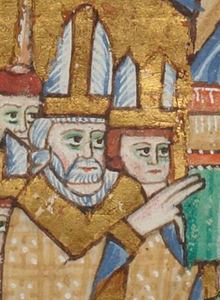
Back Pous Urbanus II Afrikaans أوربان الثاني Arabic اوربان التانى ARZ II Urban Azerbaijani Урбан II Byelorussian Урбан II (папа рымскі) BE-X-OLD Урбан II Bulgarian দ্বিতীয় পোপ আরবান Bengali/Bangla Urban II Breton Papa Urban II BS
Urban II | |
|---|---|
| Bishop of Rome | |
 Pope Urban II depicted in a c. late 12th century – early 13th century miniature, now at the National Library of France | |
| Church | Catholic Church |
| Papacy began | 12 March 1088 |
| Papacy ended | 29 July 1099 |
| Predecessor | Victor III |
| Successor | Paschal II |
| Previous post(s) |
|
| Orders | |
| Ordination | c. 1068 |
| Consecration | 20 July 1085 |
| Created cardinal | 1073 by Gregory VII |
| Personal details | |
| Born | Odo c. 1035[1] |
| Died | 29 July 1099 (aged 63–64) Rome, Papal States, Holy Roman Empire |
| Sainthood | |
| Feast day | 29 July |
| Venerated in | Catholic Church |
| Beatified | 14 July 1881 Rome by Pope Leo XIII |
| Attributes |
|
| Other popes named Urban | |
Pope Urban II (Latin: Urbanus II ; c. 1035 – 29 July 1099), otherwise known as Odo of Châtillon or Otho de Lagery,[2][A] was the head of the Catholic Church and ruler of the Papal States from 12 March 1088 to his death. He is best known for convening the Council of Clermont which ignited the series of Christian military expeditions known as the Crusades.[3][4]
Pope Urban was a native of France and was a descendant of a noble family from the French commune of Châtillon-sur-Marne.[5][6] Before his papacy, Urban was the grand prior of Cluny and bishop of Ostia.[7] As pope, he dealt with Antipope Clement III, infighting of various Christian nations, and the Turkish invasions into Anatolia. In 1095 he started preaching the First Crusade (1096–1099).[8][9] He promised forgiveness and pardon for all of the past sins of those who would fight to reclaim the holy land from Muslims and free the eastern churches.[10] This pardon would also apply to those that would fight the Muslims in Spain. While the First Crusade resulted in occupation of Jerusalem from the Fatimids, Pope Urban II died before he could receive this news.
He also set up the modern-day Roman Curia in the manner of a royal ecclesiastical court to help run the Church.[11] He was beatified by Pope Leo XIII on 14 July 1881.[citation needed]
- ^ Key Figures in Medieval Europe: An Encyclopedia: "Urban II, Pope (c. 1035–1099, r. 1088–1099)"
- ^ Celli-Fraentzel 1932, p. 97.
- ^ Richard Urban Butler (1912), "Pope Bl. Urban II", in Catholic Encyclopedia, 15, New York, Robert Appleton Company.
- ^ Theodore Freylinghuysen Collier (1911), Urban (popes)", in Chisholm, Hugh (ed.), Encyclopædia Britannica, 27, (11th ed.), Cambridge University Press, pp. 789-792.
- ^ Key Figures in Medieval Europe: An Encyclopedia. p. 641
- ^ Kleinhenz, Ch. Medieval Italy: An Encyclopedia
- ^ Becker 1988, p. 1:24–90.
- ^ Munro, Dana Carleton (1906). "The Speech of Pope Urban II. At Clermont, 1095". The American Historical Review. 11 (2): 231–242. doi:10.2307/1834642. ISSN 0002-8762. JSTOR 1834642..
- ^ Chevedden, Paul E. (2013). "Crusade Creationism "versus" Pope Urban Ii's Conceptualization of the Crusades". The Historian. 75 (1): 1–46. doi:10.1111/hisn.12000. ISSN 0018-2370. JSTOR 24455961..
- ^ Peters 1971, p. 16.
- ^ McBrien 2000, p. 182.
Cite error: There are <ref group=upper-alpha> tags or {{efn-ua}} templates on this page, but the references will not show without a {{reflist|group=upper-alpha}} template or {{notelist-ua}} template (see the help page).